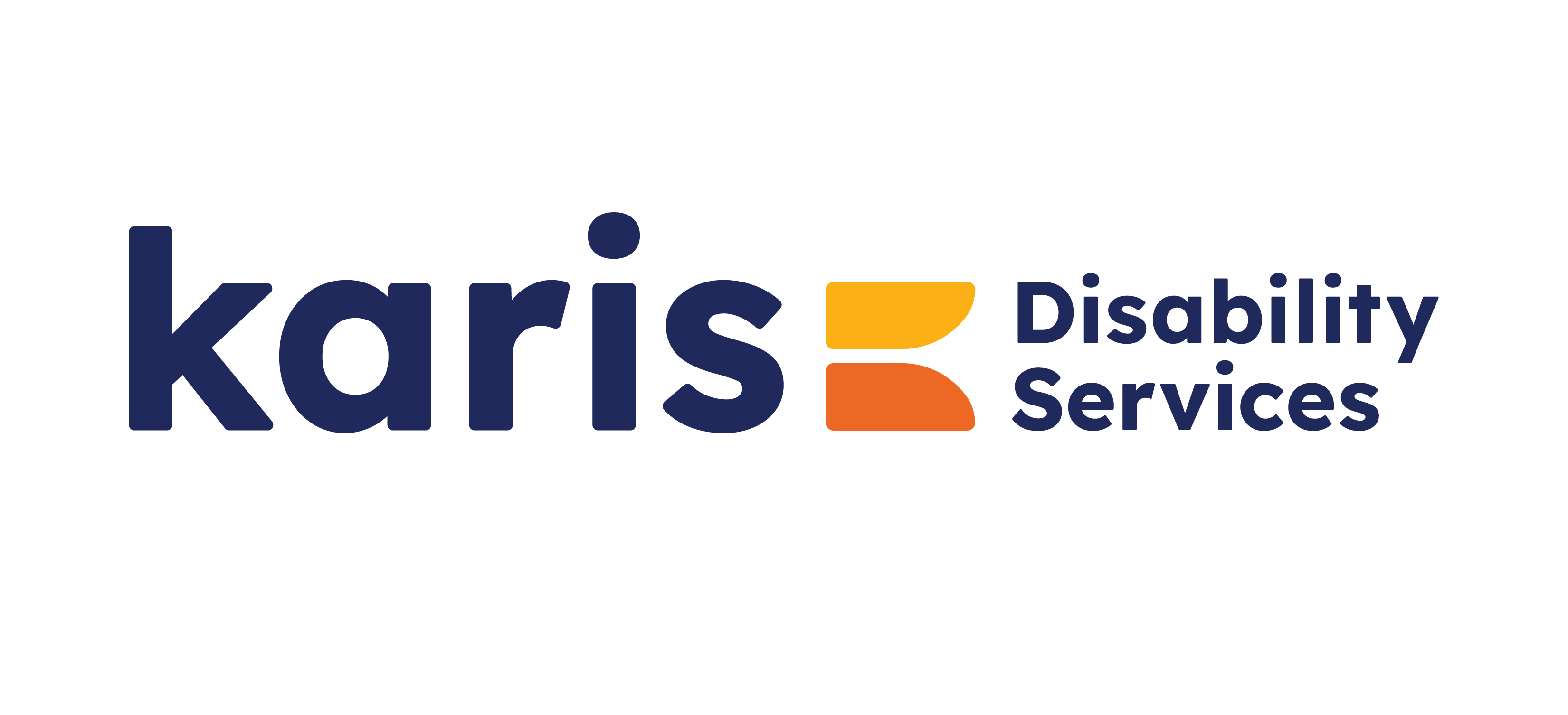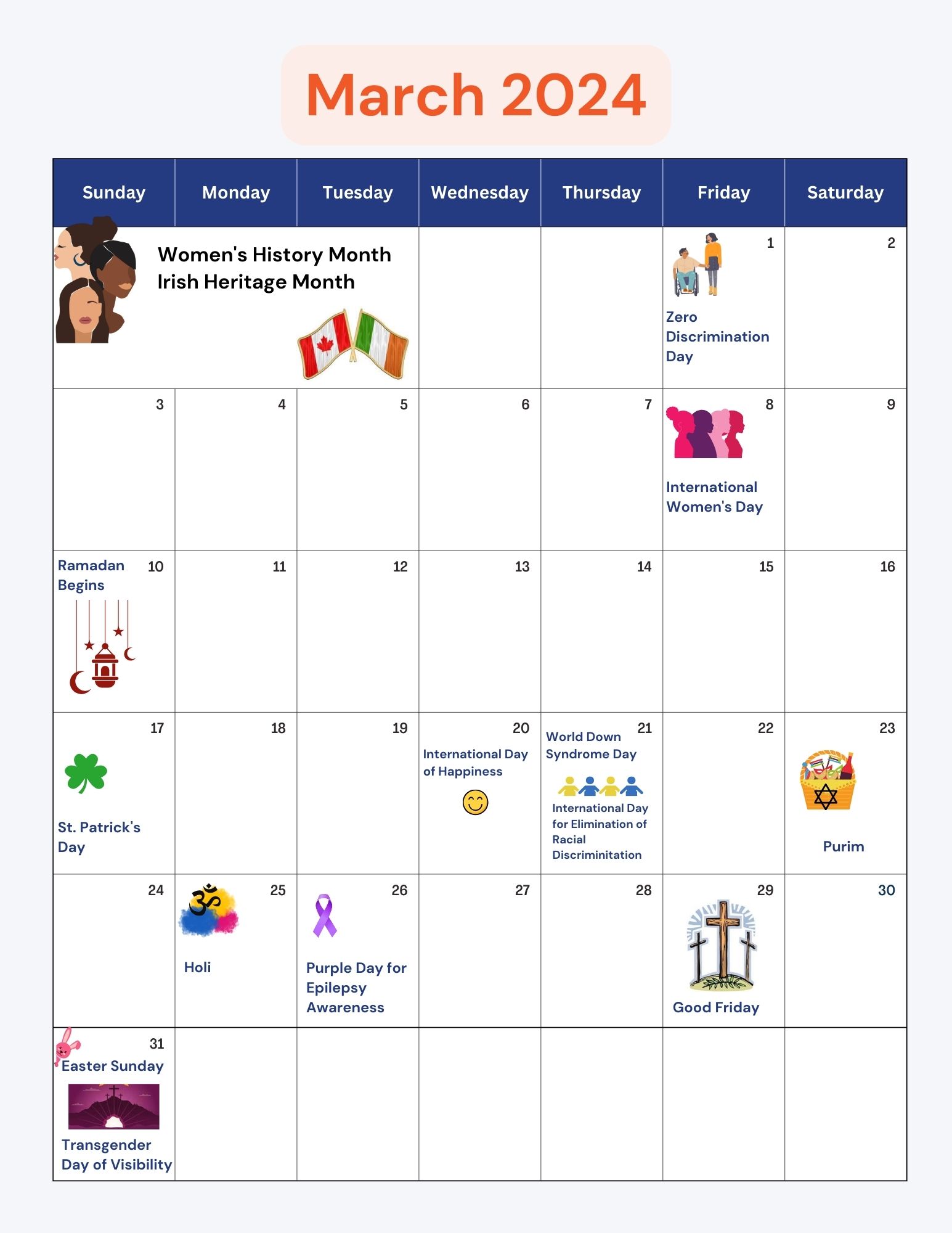February 22, 2024
The March 2024 Diversity Calendar is attached. Please print it to share with the people you serve, post it in a communal area, and keep it handy to refer to on your own.
It isn’t just a calendar: it’s a conversation starter! Use our Diversity Calendar to talk about important topics that can make a difference in our communities. Leveraging opportunities for dialogue fosters a greater sense of belonging among our teams and the people who use services.
We hope you enjoy this month’s highlights, which are full of interesting events that you may not even know exist. Take some time to look at the calendar and choose some new events to learn about things that matter to the world. Which event are you most looking forward to celebrating? Look for our Diversity Calendar every month in 2024.
It is our goal to create a comprehensive and accurate multicultural calendar that encompasses and represents the diversity of Karis. However, there may be some cultural and religious celebrations that are missing from this calendar. This is not an exhaustive list of observances. If you notice something that should be added or updated in this calendar, please reach out to us at diversity@karis.org.
Download the March Diversity Calendar
In March, we celebrate and remember:
- Women‘s History Month: highlighting contributions that women have made in history and in society. It is celebrated every March to correspond with International Women’s Day on March 8.
- Irish Heritage Month: Irish Canadians have greatly contributed to the story of our country, and this month is an opportunity to learn more about their history and positive impact. After the Irish first began arriving in what was then known as New France in the 17th century, they often faced extreme poverty and discrimination. In the 19th century, many more arrived on famine ships. Despite many challenges, they thrived, and today, almost 4.6 million Canadians in towns and cities across Canada can trace their ancestry back to Ireland.
- Zero Discrimination Day on March 1: Celebrating the right of everyone to live a full and productive life—and live it with dignity. It highlights how people can become informed about and promote inclusion, compassion, peace, and a movement for change in order to end all forms of discrimination.
- International Women’s Day on March 8: A global day celebrating the social, economic, cultural, and political achievements of women. The day also marks a call to action for accelerating women’s equality and to drive gender parity.
- Ramadan begins on March 10: In Islam, Ramadan is the holy month whereby Muslims fast during daylight hours. It is a period that aims to cleanse one’s body and soul from impurities and re-focus oneself to the worship of God. An opportunity for devotion, prayer, reflection, charity-giving, self-accountability, and celebration of the mercy and love of Allah. (Islam)
- St. Patrick’s Day on March 17: a global celebration of Irish culture and the anniversary of the death of St. Patrick, the patron saint of Ireland, in the fifth century. The Irish have observed this day as a religious holiday for over 1,000 years.
- International Day of Happiness on March 20: Since 2013, the United Nations has celebrated this day as a way to recognise the importance of happiness in the lives of people around the world. At this time of uncertainty and conflict, this year’s ‘Happier Together’ theme reminds us that lasting happiness comes from feeling connected to others and being part of something bigger.
- World Down Syndrome Day on March 21: A day to raise public awareness of Down Syndrome and the effective and meaningful inclusion and participation of all people with Down Syndrome in spaces where decisions are being made about matters relating to or affecting their lives. The theme this year is “End the Stereotypes.” Stereotypes about people with Down syndrome can do tremendous harm, causing them to be misunderstood, underestimated, and excluded. We are all so much more than any diagnosis we may have. This year we celebrate each and every individual for who they are!
- International Day for the Elimination of Racial Discrimination on March 21: Declared by the UN, this day remembers the damaging effects of racial discrimination and is a reminder to continue building a world with justice and equality. Raising awareness and gaining support for global action on racism, discrimination, xenophobia and other intolerances.
- Purim on March 23-24: The festival of Purim commemorates the heroism of Esther, and the salvation of the Jewish people from annihilation at the hands of Haman in the Achaemenid Empire. It is celebrated with Megillah readings, gifts of food, charity, feasting, and merriment. (Judaism)
- Holi on March 25: A spring festival celebrated predominantly in India by both Hindu and non-Hindu people, also known as the “festival of colours” or the “festival of love.” Holi represents the arrival of spring and the triumph of good over evil, and on this one day, the usual rankings of caste, gender, status, and age are ignored in favour of celebrating together by throwing colored water and powders on one another. (Hinduism)
- Purple Day/Epilepsy Awareness on March 26: Originating in Canada, Purple Day was invented by the incredible Cassidy Megan, a young girl motivated by the struggles she had with epilepsy. Epilepsy is a neurological disorder of the central nervous system, specifically of the brain. It is characterized by the tendency to have recurrent seizures. Epilepsy can affect anyone, anytime, anyplace and can change lives in a moment.
- Good Friday on March 29: A Christian holiday to commemorate the crucifixion of Jesus and his death at Calvary. (Christian)
- Easter on March 31: also called “Pascha” or Resurrection Sunday, is one of the holiest days in the Christian (Western) calendar, commemorating the resurrection of Jesus from the dead, described in the New Testament as having occurred on the third day of his burial following his crucifixion by the Romans at Calvary c. 30 AD. (Christian)
- Transgender Day of Visibility on March 31: recognizing the struggles, sacrifices and achievements of those who fought, and continue to fight, for gender equity. This day highlights our friends, family, colleagues and neighbours who contribute to the diversity in Canada, and it encourages us to recognize that transgender and non-binary individuals continue to resist oppression by simply being exactly who they are.
The best thing about Karis Disability Services is the people – both those who use services and those who provide services. Each person brings their own unique perspective, history, culture, faith, and identity; and there is so much beauty in that diversity!
Catalina Hernandez, on behalf of Karis Disability Services Diversity and Inclusion Working Group

